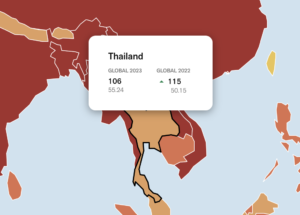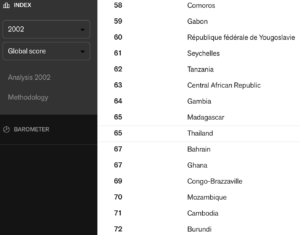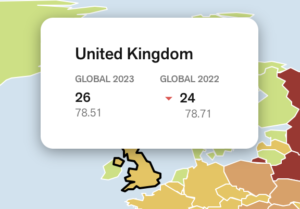Is Thailand democratic country?
Media . PoliticsThailand is a parliamentary democracy with a constitutional monarchy that was ruled by a King who also served as the head of the country. In a democratic society, everyone has an equal right to free speech and expression; moreover, the diversity of viewpoints is essential to the development of a nation and society into one that is prosperous. Every person has the right to communicate their thoughts, exchange information, and make opinions. It is a universal privilege protected by the rule of law. However, given the numerous regulations that have been issued to restrict the freedom to think, speak, type, or write, many Thai people continue to question whether we really have the right to free expression.

Source: Reporters without Borders

Source: Reporters without Borders
Thailand is in a problematic situation as evidenced by its ranking of 106 out of 180 nations in the World Press Freedom Index 2023. Most of the time, Thais typically restrict their freedom of political opinion as seen by students being arrested for holding banners during demonstrations or journalists being imprisoned for publishing articles critical of the government. Nevertheless, according to the World Press Freedom Index 2002, Thailand did once rank 65th out of 180 countries, which is the period that Thailand had a legitimately elected government. This might demonstrate the different country’s leaders at the time have different visions of the media. A recent prime Minister named Prayut Chan-o-cha stated that assisting the government’s affairs is a key major role of journalists. Furthermore, Prayut Chan-o-cha served as prime minister following the military coup in 2014, which is regarded as Thailand’s 21st military coup. Therefore, Thailand is the country with the most coups in ASEAN and the globe, ranking first and fourth, respectively. During the military coup, Thailand earned the worst score, which ranked 142 on the World Press Freedom Index 2018. The junta government has blocked freedom of expression, controlled the media, and broadened propaganda.

Source: Reporters without Borders
Because of Thailand’s lese majeste law (section 112), which states that “Whoever defames, insults, or threatens the King, the Queen, the Heir-apparent, or the Regent, shall be punished with imprisonment of three to fifteen years,” the country also restricts not only political opinion but also thoughts toward royal family. In fact, the law has been suspended for a very long time until 2018, when General Prayut Chan-o-cha reinstated Article 112 of the Criminal Code. As a result, people utilize the law as a political weapon to suppress the movement of the people against the government, including calls for reform of the monarchy. The reasons why people use this law as a weapon are the law allowing anyone to commence the case that leads to lawsuits against each other and having a high penalty rate compared to offenses for defaming the general public or offenses of insulting the King in foreign countries. Lese majeste law also lacks a defined boundary and no exceptions for the expression of opinions in good faith or for the public interest. Thus, it becomes illegal to express normal political opinions under a democratic system. Nowadays, more than 200,000 people have been prosecuted for insulting the monarchs. Although the regimes in Thailand and the United Kingdom are identical, there has not been a report of this kind of case since 1715 in the United Kingdom. Hence, England ranks in a better position in the World Press Freedom Index 2023, which is placed at 26th, despite having the same regime.

Source: Reporters without Borders
Even though Thailand placed better in this year compared to last year, the country is still in a problematic situation. I wish that we as Thai people can have the basic right to freely express our opinions towards government affairs in the same way of democratic countries.